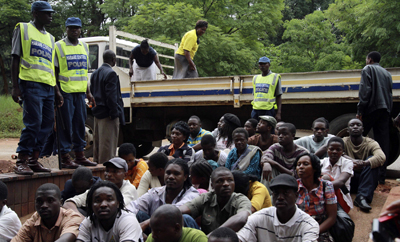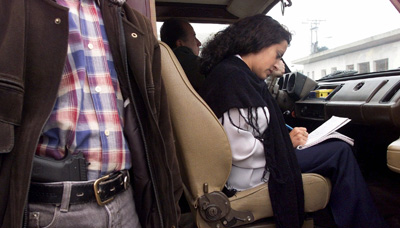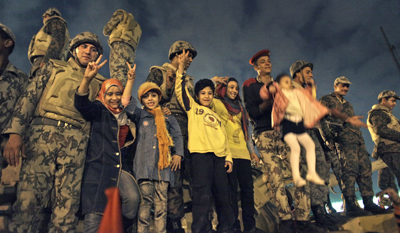Safety advisories for journalists covering Libya
The Libyan conflict is the most recent in a string of dangerous international stories. Several journalists are missing. A BBC crew was detained and subjected to beatings and a mock execution. TV crews report having their equipment seized. The Europe-based International News Safety Institute, a consortium of news organizations and journalist groups including CPJ, is…

Zimbabwe charges 45 with treason for viewing Egypt footage
The right to receive and impart information is a fundamental human right enshrined in the United Nations’ Universal Declaration of Human Rights, but in Zimbabwe, watching news of North African and Middle East protests apparently amounts to treason.
Libya’s disordered Internet
Craig Labowitz at Arbor has been sifting through the evidence of how countries in the Middle East have been blocking and throttling the Internet in the last week. His analysis indicates that while both Bahrain and Yemen had periods of slowed or impaired access, only Libya seems to have taken the drastic step of shutting off the…

Documenting sexual violence against journalists
The news of the sexual assault against CPJ board member and CBS correspondent Lara Logan hit us hard on Tuesday. At CPJ, we work daily to advocate on behalf of journalists under attack in all kinds of horrific situations around the world. Because of Lara’s untiring work with our Journalist Assistance program, she’s well known…

Courage in documenting Egypt’s revolution
Today, on its 18th day, the Egyptian revolution has finally achieved its goal, deposing Hosni Mubarak and his regime. Egyptian journalists who have courageously found ways to work under the yoke of Mubarak’s censorship and repression are releasing a sigh of relief that they’ve held in for three long decades.

Reporter goes inside Egypt’s Mukhabarat torture regime
When Radio Free Europe/Radio Liberty reporter Robert Tait was taken into custody by Egyptian authorities at a police checkpoint near central Cairo on February 4, he didn’t know he’d become witness to torture. But, cuffed and blindfolded for 28 hours, Tait heard and saw beatings and electrocutions. “My experience, while highly personal, wasn’t really about…

CPJ’s Simon on Huffington Post: What is at stake in Egypt
CPJ’s executive director lays out “What Is at Stake With Egypt’s Media Crackdown” in a February 3 piece on the Huffington Post. Joel Simon writes: “With no witnesses, those undertaking the violence in Egypt will have a free hand to carry out their brutal campaign without restraint. Standing up for the rights of journalists at this…
CPJ’s Abdel Dayem talks Egypt on Democracy Now!
CPJ Middle East and North Africa Program Coordinator Mohamed Abdel Dayem spoke to Democracy Now! on February 5 about the deteriorating environment for journalists in Egypt. He told host Amy Goodman that state news outlets have become something unrecognizable: “State-owned media are no longer engaged in the business of news,” Abdel Dayem said. “They are…
Egypt rejoins the Net
Internet connectivity has been restored to Egypt, though it’s hard to tell from the outside just how reliable that connection is. Monitoring organizations Renesys and BGPMon provide technical details on their blogs. For a more dynamic display, RIPE, the community which helps co-ordinate the European Internet, has a live graph of the numbers of Internet…